Which English translation of Demons should I read?
So, you want to read Dostoevsky’s darkest and most hilarious novel, a controversial political satire, the title of which has been variously rendered as The Possessed, The Devils, Devils, and Demons? By all accounts, it’s intense!
Robert L. Belknap says in his introduction: “From its title to its final sentence, this novel deals with insanity…. It is often said that there are two kinds of novel, those that tell the reader what is happening, and those that show the reader what is happening. In the nineteenth century, Dostoyevsky and other Russians were inventing a third kind of novel, one that also made the reader experience what is happening. Demons not only tells us about scandals and catastrophes, and shows them to us; it uses its whole structure to carry us through irony, then anger, then into the experience of being manipulated towards madness…. It is a scary book.”
Open Culture: “Albert Camus Talks About Nihilism & Adapting Dostoyevsky’s The Possessed for the Theatre, 1959” by Mike Springer
“The themes explored in The Possessed were so absorbing to Camus that in 1959 he published a three-act stage adaptation, Les Possédés. The play premiered on January 28, 1959 at the Théâtre Antoine in Paris…. In the program handed out at the theater that night, Camus described the novel’s importance: ‘Les Possédés is one of the four or five works that I rank above all others. In more ways than one, I can say that it has enriched and shaped me.’”
Demons: translations in English
Demons was serialized in Russian from 1871 to December 1872. The complete novel was published in Russian in 1873.
You’ve got five in-print English translations to choose from, seven in total.
- 1914 – Constance Garnett
- 1953 – David Magarshack
- 1962 – Andrew R. MacAndrew
- 1992 – Michael R. Katz
- 1994 – Richard Pevear and Larissa Volokhonsky
- 2008 – Robert A. Maguire
- 2017 – Roger Cockrell
As a 150-year-old political novel, is Demons still worth reading today?
Yes, definitely.
From the Afterword by Marc Slonim (1962): “The Possessed is not only a novel about revolution, crime, atheism, religion, strong men, underground men, and the Russian past and present. It is, despite its dangerous closeness to melodrama and bad taste, one of the most captivating and thrilling tales of modern literature. And the story of extraordinary people, romantic adventures, and paradoxical ideas is told by a great builder of plots, a master psychologist and an artist-thinker who transforms abstract concepts into living realities, and turns symbolic, greater-than-life characters into believable and memorable representatives of humanity.”
The New Criterion: “Demons at 150” by Jacob Howland
“Dostoevsky makes it possible to infer everything he wants to communicate in Demons, but it must all be dug out. Those who are patient enough to do so… can expect to be rewarded with despair…. Dostoevsky uniquely deduced the political horrors of the twentieth century from the ideological viruses of the nineteenth. He also has his finger on the pulse of our own epoch, and the prognosis is grim.”
The Imaginative Conservative: “Dostoevsky’s Demons Is a Novel for Our Times” by Adam De Gree
“Dark, funny, and frenetic, Fyodor Dostoevsky’s Demons is a startlingly accurate portrayal of possession by ideology. Its biting prose tears into the many ‘isms’ that haunt the modern world. Yet while the novel is often billed as a work of political prophecy, politics may be the least interesting thing about it. Dostoevsky only intended to make Demons a short broadside against nihilism, but the plot ran away from him. The improvised masterpiece that emerged from three years of painful composition is as profound as it is unsettling.”
Why is it called ‘The Possessed’, ‘The Devils’, ‘Devils’, and ‘Demons’?
From the foreword written by translator Richard Pevear: “Dostoevsky called the novel Demons, we would suggest, precisely because the demons in it do not appear, and the reader might otherwise overlook them. The demons are visible only in distortions of the human image, the human countenance, and their force is measurable only by the degree of the distortion…. [T]he demons are that legion of isms that came to Russia from the West: idealism, rationalism, empiricism, materialism, utilitarianism, positivism, socialism, anarchism, nihilism, and, underlying them all, atheism.”
Is Demons based on a true story?
In his afterword, Marc Slonim says: “As was customary with Dostoyevsky, he did not simply represent reality, but borrowed facts and occurrences from it which were then transformed in the laboratory of his creative imagination.” Dostoevsky was inspired to write Demons in part by the shocking 1869 murder of a student named Ivan Ivanov by a secret revolutionary group he had joined. Sergey Nechayev, the group’s leader, was eventually apprehended, but carried on coordinating revolutionary activity from jail, where he died. The character Pyotr Stepanovich Verkhovensky is based on Nechayev; Ivan Shatov is based on Ivan Ivanov. The foreword to the Vintage Classics edition tells more about the event and its impact on Dostoevsky.
Is Demons complete?
A chapter called “At Tikhon’s” or “Stavrogin’s Confession” was omitted from the original Russian edition (and subsequent editions) because Dostoevsky’s editor objected to the rather dark subject matter.
The missing chapter is commonly included in modern editions, sometimes in the novel and sometimes as an appendix. There is a public-domain English translation of the text by S.S. Koteliansky and Virginia Woolf freely available online.
Download chapter from Gutenberg.org
Who was Constance Garnett?
She was a prolific translator credited with popularizing many works in Russian, including Crime and Punishment, The Brothers Karamazov, The Idiot, War and Peace, and Anna Karenina.
About the Garnett translation of Demons
Penguin’s Note on the Text in the Maguire translation credits the ‘indefatigable’ Constance Garnett, who translated Dostoevsky, Chekhov, Gogol, Tolstoy, and Turgenev, with ‘single-handedly’ creating a craze for Russian works. However, “fashions in translation, as in so much else, change with the times…. [T]oday’s reader now embraces [Dostoevsky’s instances of supposed carelessness] that Garnett erased or smoothed over and wishes to grapple with the obscurities, rather than have them clarified or interpreted. In other words, rather than attempting to adapt Dostoyevsky’s prose to the norms of ‘good’ English prose, whatever that may be, the modern translator seeks to reproduce as faithfully as possible Dostoyevsky’s text in all its complexity, sometimes at the expense of the ‘good, smooth’ English so favoured by reviewers. This faithfulness to Dostoyevsky’s text must begin with the title. The Possessed was an inspired choice on the part of Garnett, but the fact of the matter remains that it is not the title that Dostoyevsky gave his novel. The title in Russian is Besy, literally Demons, which is reinforced by the repetition of the word bes in the two epigraphs. Furthermore, Garnett’s title redirects the action: Dostoyevsky’s title, like the epigraphs, speaks of the demons by which one is possessed, not of those who are possessed.”
Extract from the Garnett translation of Demons
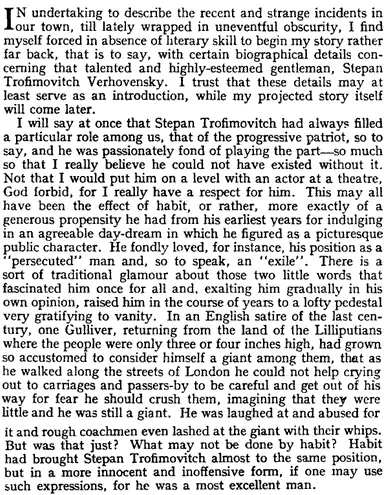

Get the Wordsworth Classics Garnett translation of The Possessed
Introduction by ADP Briggs. Includes a list for further reading and a note on the text.
Available as a paperback (ISBN 9781840220995, 720 pages).
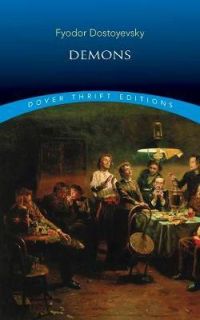
Get the Dover Thrift Editions Garnett translation of The Possessed
Edited by Janet B. Kopito.
Available as a paperback (ISBN 9780486817385, 704 pages).
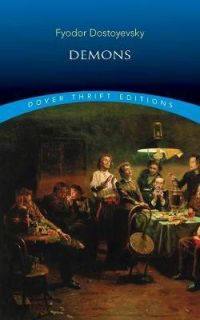
Get the Dover Thrift Editions Garnett translation of The Possessed
Available as an ebook.
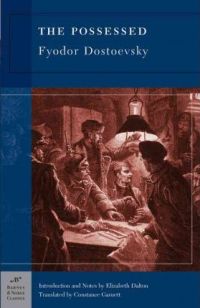
Get the Barnes & Noble Garnett translation of The Possessed
Introduction and notes by Elizabeth Dalton. This edition is out of print.
Available as a paperback (ISBN 9781593082505, 768 pages).

Get the Gutenberg Garnett translation of The Possessed
Does not have the dropped chapter.
Available as an ebook.
Who was David Magarshack?
David Magarshack was a British biographer and translator. He translated Russian works by Dostoevsky, Chekhov, Goncharov, Gogol, and Tolstoy, including Crime and Punishment, The Brothers Karamazov, The Idiot, and Anna Karenina.
Bloggers Karamazov: “David Magarshack, the Penguin Archive, and Translating Dostoevsky: A Chat with Cathy McAteer”
Cathy McAteer’s research on Penguin led her to detailed papers about Magarshack’s approach to translation. He had two goals: to become a financial success and to “refashion the Russian literature translated by Constance Garnett.” When he died, he was preparing a book (which was never published) on the practice of literary translation.
There is much more about Magarshack in Cathy McAteer’s 196-page book, Translating Great Russian Literature: The Penguin Russian Classics, published in 2021 by Routledge.
About the Magarshack translation of Demons
The translator’s introduction talks about the genesis of the novel and Dostoevsky’s feud with Turgenev.
Older versions lack the chapter “At Tikhon’s (Stavrogin’s Confession)”.
Originally published by Penguin. Out of print.
Extract from the Magarshack translation of Demons
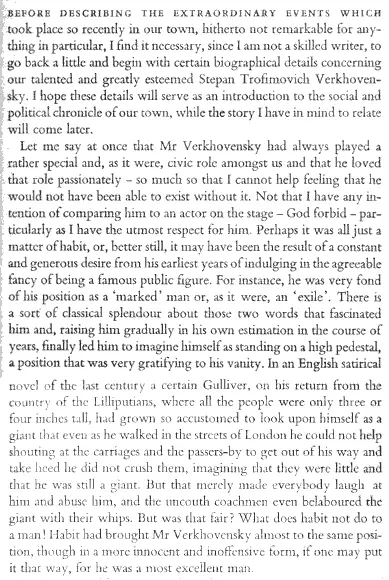
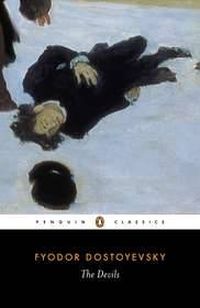
Get the Penguin Classics Magarshack translation of The Devils
With an introduction by the translator. Includes Stavrogin's Confession as an appendix. Out of print.
Available as a paperback (ISBN 9780140440355, 704 pages).
Who was Andrew R. MacAndrew?
Andrew Robert MacAndrew was a professor at the University of Virginia and translator of plays and novels in Russian. He was born in 1911 and died in 2001.
About the MacAndrew translation of Demons
Published by Signet Classics. Includes a seven-page afterword by Marc Slonim and a selected bibliography. Out of print.
The chapter “At Tikhon’s (Stavrogin’s Confession)” is located within the text itself rather than as an appendix.
Extract from the MacAndrew translation of Demons
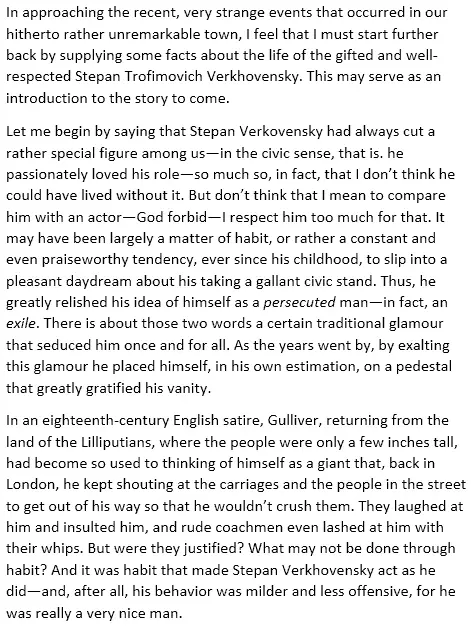
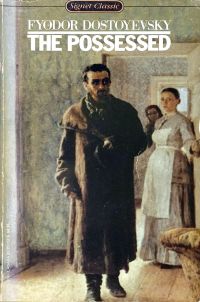
Get the Signet Classics MacAndrew translation of The Possessed
With an afterword by Marc Slonim. Out of print.
Available as a paperback (ISBN 0451519183, 696 pages).
Who is Michael R. Katz?
Michael Katz is an Emeritus Professor of Russian and East European Studies and the translator of over a dozen Russian novels, including Crime and Punishment.
» Read the New England Review’s interview with Michael R. Katz
About the Katz translation of Demons
Katz’s Introduction: “Devils is without doubt Dostoevsky’s most humorous work. It has more irony, more elements of burlesque and parody, more physical comedy and buffoonery, more exaggerated characterizations and ambiguous use of language than any of this other works. It has often been claimed that humour is ‘one of the things that gets lost in translation’. This new version attempts to capture some of the author’s comic devices and find suitable equivalents for them in English.”
From the Translator’s Note: “Certain characters in the novel, according to the habit of aristocratic Russians of the period, mix French with their Russian. It would be distracting to provide English translations of every French phrase…. Those phrases necessary for comprehension are translated at the foot of the page.”
The chapter “At Tikhon’s” is located within the text itself rather than as an appendix.
Extract from the Katz translation of Demons
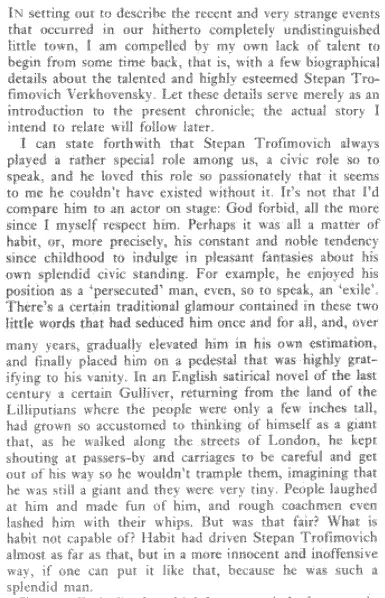
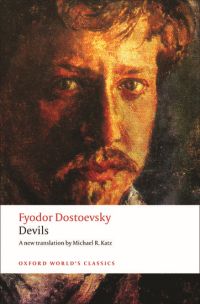
Get the Oxford World's Classics Katz translation of Devils
Introduction and endnotes by the translator. Also includes a note on the text, a translator's note, a select bibliography, a chronology of the author, and a list of characters. Includes footnotes in English for repeated French phrases. Contains the originally omitted chapter in the novel itself.
Available as a paperback (ISBN 9780199540495, 800 pages).
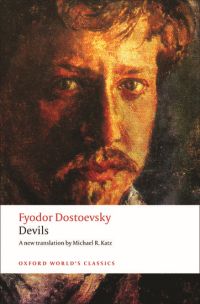
Get the Oxford World's Classics Katz translation of Devils
Introduction and endnotes by the translator. Also includes a note on the text, a translator's note, a select bibliography, a chronology of the author, and a list of characters. Includes footnotes in English for repeated French phrases. Contains the originally omitted chapter in the novel itself.
Available as an ebook (ISBN 9780192643346).
Who are Richard Pevear and Larissa Volokhonsky?
They are a husband-and-wife translation team. Pevear was born in the US and Volokhonsky in Russia. Together they have translated works by Bulgakov, Gogol, Pasternak, Chekhov, Turgenev, and Pushkin as well as Crime and Punishment, The Brothers Karamazov, The Idiot, The Master and Margarita, and War and Peace. Separately, Pevear has also translated works in French, Italian, Spanish, and Greek, including The Three Musketeers.
Kirkus Reviews: Demons
“Dostoevsky’s sprawling political novel is given new life in this fresh translation [of] one of Dostoevsky’s most complex and dense works…. Volokhonsky and Pevear’s translation brings to the surface all of Dostoevsky’s subtle linguistic and nationalist humor, and the copious notes are indispensable for making one’s way through the thicket of 19th-century Russian politics.”
The Everyman’s Library edition has a 21-page introduction by Joseph Frank which talks about the origins, development, context, and meaning of the novel.
The chapter “At Tikhon’s” is included as an appendix.
Extract from the Pevear & Volokhonsky translation of Demons
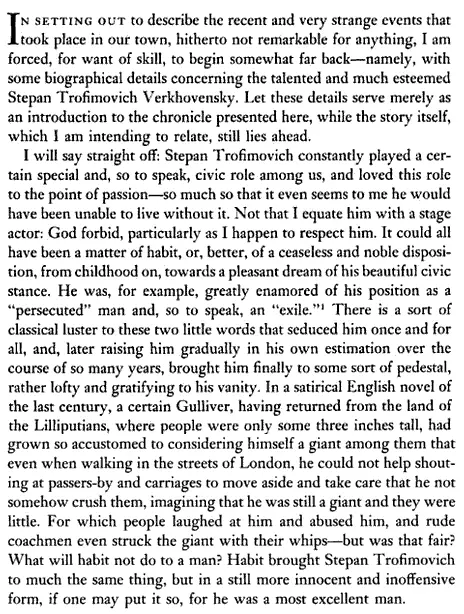
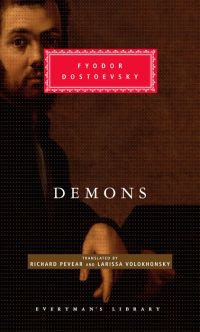
Get the Everyman's Library Pevear & Volokhonsky translation of Demons
Introduction by Joseph Frank.
Available as a hardcover (ISBN 9780375411229, 776 pages).
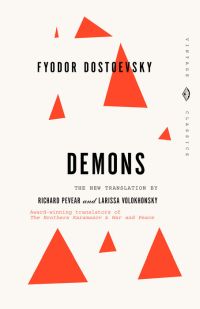
Get the Vintage Classics Pevear & Volokhonsky translation of Demons
Includes endnotes, a foreword, and a translators' note. Includes At Tikhon's as an appendix.
Available as a paperback (ISBN 9780679734512, 768 pages).
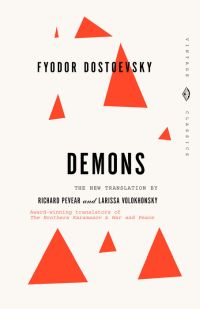
Get the Vintage Classics Pevear & Volokhonsky translation of Demons
Includes endnotes, a foreword, and a translators' note. Includes At Tikhon's as an appendix.
Available as an ebook (ISBN 9780307434869).

Get the Vintage Classics Pevear & Volokhonsky translation of Demons
Includes endnotes, a foreword, and a translators' note. Includes At Tikhon's as an appendix.
Available as a paperback (ISBN 9780099140016, 768 pages).

Get the Vintage Classics Pevear & Volokhonsky translation of Demons
Includes endnotes, a foreword, and a translators' note. Includes At Tikhon's as an appendix.
Available as an ebook (ISBN 9781446485316).
Who was Robert A. Maguire?
Robert Maguire was a professor of Slavic languages. He produced translations from Polish and Russian. He was an expert on Gogol.
» New York Times obituary of Robert A. Maguire
» Profile of Robert A. Maguire at Columbia University
About the Maguire translation of Demons
The introduction by Robert L. Belknap kindly includes a spoiler warning. In his introduction, Robert L. Belknap discusses Dostoevsky’s own revolutionary activities, his narrative technique and use of different genres, and the background of Radicalism in Imperial Russia. Belknap identifies and explains three strands in the novel: the Society Tale, the Anti-Nihilist Novel, and the Psychological Novel, the three fictional genres roughly corresponding to the novel’s three parts.
Maguire died of cancer having completed the first round of revisions of his translation. He had charged editor Ronald Meyer with the responsibility of helping the manuscript into print should he be unable to see the project through to the end himself, so Meyer sorted out the remaining loose ends.
The chapter “At Tikhon’s” is included as an appendix.
Extract from the Maguire translation of Demons
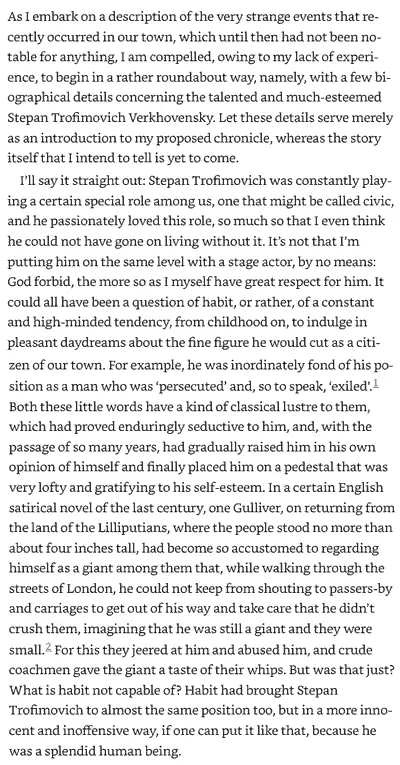

Get the Penguin Classics Maguire translation of Demons
Introduction by Robert L. Belknap. Includes author bio, chronology, introduction, list for further reading, a note on the text, and a note from the editor (Ronald Meyer). Includes At Tikhon's as an appendix. Includes a list of characters, endnotes and glossary.
Available as a paperback (ISBN 9780141441412, 880 pages).
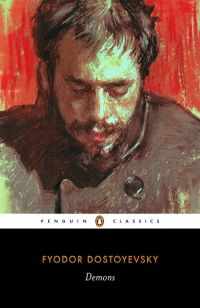
Get the Penguin Classics Maguire translation of Demons
Introduction by Robert L. Belknap. Includes author bio, chronology, introduction, list for further reading, a note on the text, and a note from the editor (Ronald Meyer). Includes At Tikhon's as an appendix. Includes a list of characters, endnotes and glossary.
Available as an ebook (ISBN 9780141917283).
Who is Roger Cockrell?
Roger Cockrell is a writer, translator, and British scholar specializing in Russian literature. He translated Dostoevsky’s Crime and Punishment, The House of the Dead, and Uncle’s Dream for Alma Classics. He has also translated works by Bulgakov, Gogol, Tolstoy and Chekhov.
About the Cockrell translation of Demons
The chapter “At Tikhon’s” is located within the text itself rather than as an appendix.
Extract from the Cockrell translation of Demons
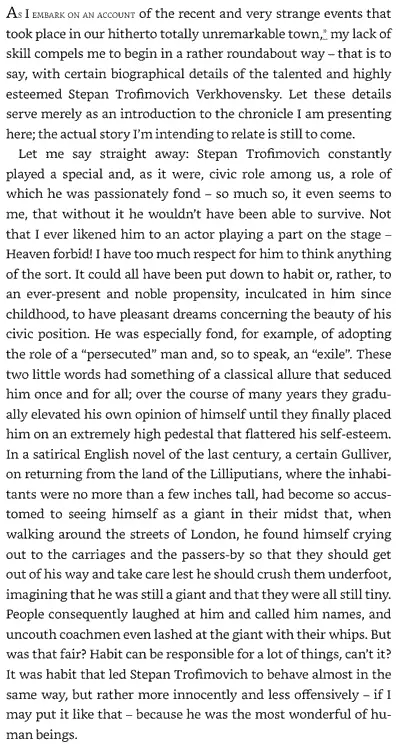
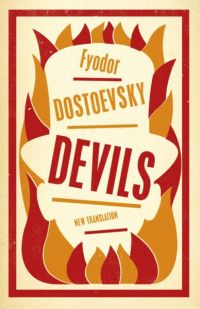
Get the Alma Classics Cockrell translation of Devils
Includes an introduction, translator's note, list of characters, note on the text, endnotes, an author bio, info on Dostoevsky's works, and a select bibliography.
Available as a paperback (ISBN 9781847496416, 768 pages).
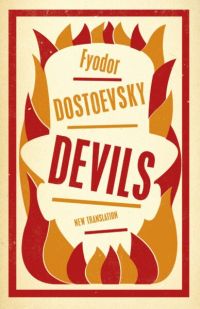
Get the Alma Classics Cockrell translation of Devils
Includes an introduction, translator's note, list of characters, note on the text, endnotes, an author bio, info on Dostoevsky's works, and a select bibliography.
Available as an ebook.
What’s the best Demons translation?
There’s an ongoing literary feud about the relative merits of the classic Garnett Russian translations versus the recent Pevear and Volokhonsky Russian translations. There are a bunch of links to relevant articles on the Crime and Punishment translations page.
If you’re a fan of Pevear and Volokhonsky, then go for theirs.
If you want a free ebook, you can get the Garnett translation online because it’s in the public domain. There are also lots of cheap reprints.
Among the other three in-print translations, it’s hard to choose. I think the best advice for choosing a translation in general is to read samples and decide whose prose you’re most willing to spend several hundred pages with.
Maguire’s language seems a bit more formal, or ‘fussier’ than Katz’s; I believe both translators are American; at any rate their careers are.
Cockrell, meanwhile, is British, though I didn’t notice anything particularly British-sounding about his translation in the sample passage.
Already have a favorite translation of Demons? Let us know which one and why in the comments!
More Dostoevsky
Other Novels by Fyodor Dostoevsky
- The Village of Stepanchikovo (aka The Friend of the Family)
- Humiliated and Insulted (aka The Insulted and Humiliated, The Insulted and the Injured, Injury and Insult)
- The House of the Dead (aka Notes from a Dead House, etc.)
- Notes from Underground
- Crime and Punishment
- The Idiot
- The Adolescent (aka A Raw Youth, An Accidental Family)
- The Brothers Karamazov
Novellas by Fyodor Dostoevsky
- Poor Folk
- The Double
- The Landlady
- Uncle’s Dream
- The Gambler
- The Eternal Husband

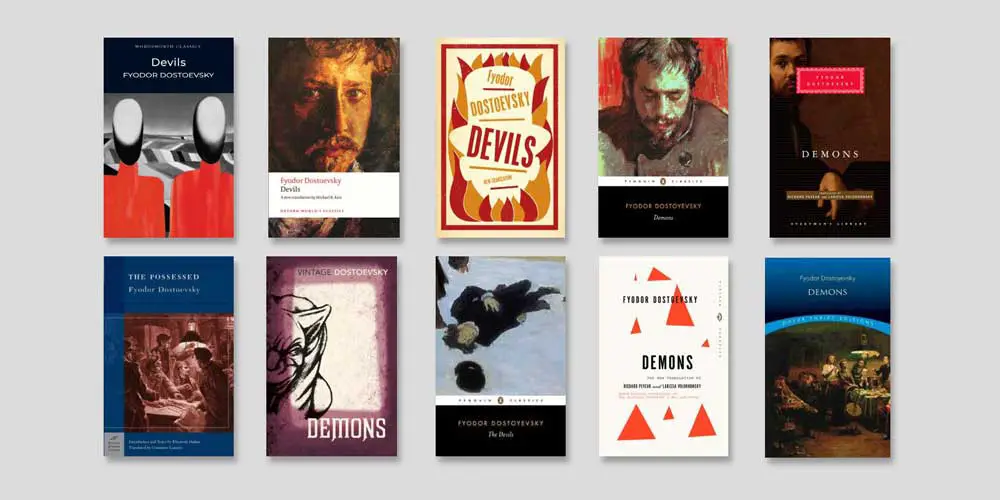
Definitely Pevear and Volokhonsky. His foreword for Demons shows the deep understanding of the author, his complete works, and his times a translator needs to make choices when rendering a nineteenth century work in contemporary English and conveying the implied connotations as well as the explicit arguments of such a complex author and time.